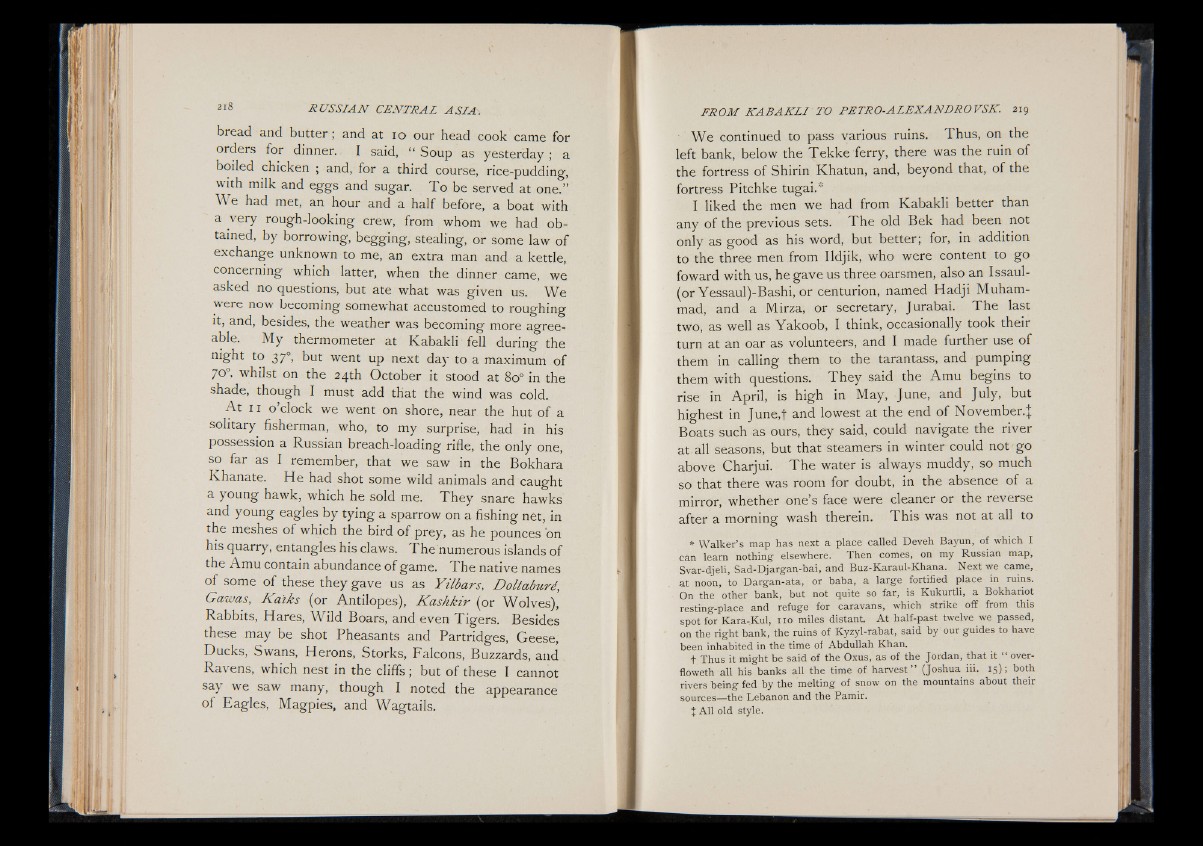
bread and butter; and at 10 our head cook came for
orders for dinner. I said, “ Soup as yesterday; a
boiled chicken ; and, for a third course, rice-pudding,
with milk and eggs and sugar. T o be served at one.”
We had met, an hour and a half before, a boat with
a very rough-looking crew, from whom we had obtained,
by borrowing, begging, stealing, or some law of
exchange unknown to me, an extra man and a kettle,
concerning which latter, when the dinner came, we
asked no questions, but ate what was given us. We
were now becoming somewhat accustomed to roughing
it, and, besides, the weather was becoming more agreeable.
My thermometer at Kabakli fell during the
night to 370, but went up next day to a maximum of
70°, whilst on the 24th October it stood at 8o° in the
shade, though I must add that the wind was cold.
A t 11 o’clock we went on shore, near the hut of a
solitary fisherman, who, to my surprise, had in his
possession a Russian breach-loading rifle, the only one,
so far as I remember, that we saw in the Bokhara
Khanate. He had shot some wild animals and caught
a young hawk, which he sold me. T h e y snare hawks
and young eagles by tying a sparrow on a fishing net, in
the meshes of which the bird o f prey, as he pounces on
his quarry, entangles his claws. The numerous islands of
the Amu contain abundance of game. The native names
o f some o f these they gave us as Yilbars, Doltaburd,
Gawas, K a ik s (or Antilopes), K a sh k ir (or Wolves),
Rabbits, Hares, Wild Boars, and even Tigers. Besides
these may be shot Pheasants and Partridges, Geese,
Ducks, Swans, Herons, Storks, Falcons, Buzzards, and
Ravens, which nest in the cliffs; but o f these I cannot
say we saw many, though I noted the appearance
o f Eagles, Magpies, and Wagtails.
W e continued to pass various ruins. Thus, on the
left bank, below the Tek ke ferry, there was the ruin of
the fortress of Shirin Khatun, and, beyond that, of the
fortress Pitchke tugai.*
I liked the men we had from Kabakli better than
any of the previous sets. T he old Bek had been not
only as good as his word, but better; for, in addition
to the three men from Ildjik, who were content to go
foward with, us, he gave us three oarsmen, also an Issaul-
(or Yessaul)-Bashi, or centurion, named Hadji Muhammad,
and a Mirza, or secretary, Jurabai. T he last
two, as well as Yakoob, I think, occasionally took their
turn at an oar as volunteers, and I made further use of
them in calling them to the tarantass, and pumping
them with questions. T hey said the Amu begins to
rise in April, is high in May, June, and July, but
highest in June,f and lowest at the end of November.J
Boats such as ours, they said, could navigate the river
at all seasons, but that steamers in winter could not' go
above Charjui. The water is always muddy, so much
so that there was room for doubt, in the absence of a
mirror, whether one’s face were cleaner or the reverse
after a morning wash therein. This was not at all to
* Walker’s map has next a place called Deveh Bayun, of which I
can learn nothing elsewhere. Then comes, on my Russian map,
Svar-djeli, Sad-Djargan-bai, and Buz-Karaul-Khana. Next we came,
at noon, to Dargan-ata, or baba, a large fortified place in ruins.
On the other bank, but not quite so far, is Kukurtli, a Bokhariot
resting-place and refuge for caravans, which strike off from this
spot for Kara-Kul, n o miles distant. At half-past twelve we passed,
on the right bank, the ruins of Kyzyl-rabat, said by our guides to have
been inhabited in the time of Abdullah Khan.
-f- xhus it might be said of the Oxus, as of the Jordan, that it over-
floweth all his banks all the time of harvest” (Joshua iii. 15); both
rivers being fed by the melting of snow on the mountains about their
sources—the Lebanon and the Pamir.
X All old style.